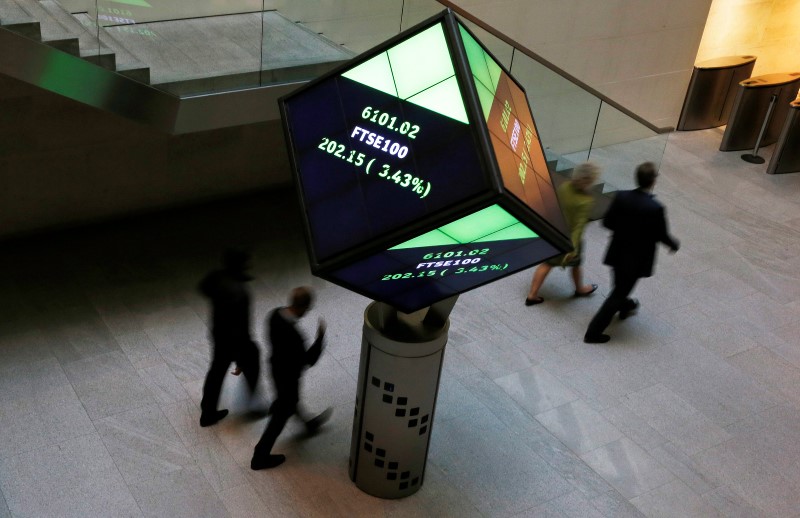By Marc Jones
LONDON (Reuters) - The euro steadied and European shares and bonds rebounded on Friday after being savaged on Thursday when the European Central Bank signaled it was unlikely to cut its negative interest rates further in the wake of a huge new stimulus plan.
Markets were starting to focus on what they saw as the positive features of the ECB policy package, with surges to 2016 highs for both U.S. oil prices and China's yuan also boosting confidence.
Wall Street (ESc1) was expected to open around 1 percent higher while Europe's FTSEurofirst 300 (FTEU3) jumped 2.3 percent as German shares <.GADXI> enjoyed their best day of the year and Italian markets (FTMIB) surged over 4 percent. (EU)
Euro traders were getting their breath back after a near 4 cent move for the currency following the ECB's announcements.
The euro slipped back to $1.1110
"The markets are doing alright today," Societe Generale (PA:SOGN) FX strategist Alvin Tan said. "The ECB did deliver easing for sure but it was a mixed message."
"It fits with our broader view that for the euro -- and the yen, for that matter -- to drop durably lower, the (U.S. Federal Reserve) will have to raise its rates further."
Bond markets were also stabilizing, with German Bunds down 5 basis points at 0.26 percent .
At one point, on Thursday German 10-year yields (DE10YT=RR) doubled from a low of 16 basis points to a peak of 32 basis points, an enormous move for a benchmark long-term bond.
ECB President Mario Draghi's suggestion there would be no further interest rates cuts overshadowed the euro zone central bank's bold easing package, prompting criticism that he had once again botched his communication.
He was quick to note that new facts could change the outlook and emphasized his willingness to adopt other radical measures, but by then the damage was done.
Against the yen, the euro hit a three-week high of 126.86 yen on Friday, but as with other currencies spent most of the European session reversing and was at 126.40 (EURJPY=) as U.S. trading neared.
The dollar bounced back after coming off sharply as the risk mood darkened. It was last up 0.5 percent at 113.78 yen
Against a basket of it main FX peers, the U.S. currency added about 0.6 percent to 96.654 (DXY), but it was still down 0.7 percent for the week, having shed 1 percent on Thursday.
Many analysts considered the market reaction to the ECB rather perverse given the actual steps were very aggressive.
As well as cutting all its main interest rates, the bank lifted its asset-buying program by 20 billion euros a month, expanded the assets to include non-bank corporate debt and said it would effectively pay banks to take its cash and lend it on.
HOT OIL
In commodity markets, oil prices also edged higher after dropping on Thursday, extending the recent run of see-saw trading. [O/R]
Brent (LCOc1) added 1.7 percent to $40.73 a barrel, while U.S. crude (CLc1) gained 2.2 percent to $38.67 to hit its highest level of the year. Both of the benchmarks are now up roughly 50 percent since their mid-January lows. [O/R]
The latest lift came from International Energy Agency, which coordinates energy policies of industrialized nations, as it said that oil prices may have finally bottomed out.
Production declines in the United States and other non-OPEC producers are accelerating and an increase in supply from Iran has been less than dramatic than expected, it added.
"There are clear signs that market forces ... are working their magic and higher-cost producers are cutting output," the Paris-based IEA said.
Europe's oil and gas index (SXEP) rose 1.9 percent and the STOXX Europe 600 Basic Resources index (SXPP) was up 1 percent, as prices of major industrial metals also rose sharply.
Bank stocks (SX7E) were the top sectoral gainers, however, up over 5 percent as the fact the ECB will now be giving out interest free loans and paying any bank that makes even the most minor improvements to its lending levels, began to sink in.
The rise in the dollar was starting to take the shine off gold, which had earlier made a 13-month top at $1,282.51
Overnight, Asian shares had risen as the region also secured weekly gains to outpace most of the rest of the world.
MSCI's broadest index of Asia-Pacific shares outside Japan (MIAPJ0000PUS) rose 1.1 percent on the day and the week, while Australia (AXJO) ended up 0.3 percent.
Japan's Nikkei (N225) erased earlier sharp losses and ended up 0.5 percent, though still fell 0.4 percent over the week.
Chinese shares lagged the region, weighed down by the banking sector, as Beijing's plan to allow debt-to-equity swaps by commercial lenders was viewed by some investors as being largely negative. New lending by banks also sank.
The blue-chip CSI300 index (CSI300) staged a late recovery to close up 0.1 percent but both it and Shanghai Composite Index <.SSEC> were down over 2 percent for the week.

China's central bank underlined its commitment to a firm yuan by fixing the currency at the high for this year.